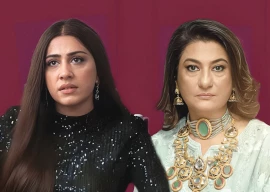
I went to watch Abdullah: The Final Witness with no expectations in mind. As a film enthusiast, the only catch was that it depicts the holy Kharotabad incident and I assumed that, too, must’ve been dumbed down because of the censor board’s requirements. That, however, was not the case.
The fact that makes Abdullah stand out amongst films of its kind, such as Revenge of the Worthless, is its honesty and duration. This is an unapologetic film that covers the loss of innocent lives as prominently as it focuses on the frailty of our judicial system, which, at one instance, is abused by investigators and on the other, used by those seeking absolute truth. It’s a brave film to say the least and both the director Hashim Nadeem and the censor boards deserve credit for not submitting to the ‘national interest’ too much.
Where the film ends up looking like a student thesis that runs out of budget, Nadeem manages to evoke much-needed drama. It takes too long to come to that point but if you survive the sprint, you’re in for a reward. The short distance of just 90 minutes is perhaps the film’s biggest strength. Abdullah could easily have operated as an epic short film. It’s not your regular popcorn buddy and gives enough reasons to leave in the first half, after establishing itself on firm grounding.
Yet, it has a soul that is equally depressing and reflective of our world; of times when five foreigners, including three women, are gunned down by security officials in the outskirts of Quetta for being ‘suspected terrorists’ and later turn out to be innocent. The film has been told from the perspective of the driver who brings the four Russians and one Tajik to Quetta.
Hameed Sheikh, as Abdullah the driver, is marginally different from Wahidullah in Moor but equally convincing. The beard’s black, the hands do not shake and yet, he carries the burden of a demented conscience with grace and power. Imran Abbas may not have his own voice but the new one actually made him quite convincing as a typical Pashtun boy from Quetta who cares more about getting hitched than getting a job. Abbas, you shouldn’t be ashamed of this one. This wasn’t that mushkil to bear.
The central problem of Abdullah is common with Jamal Shah’s Revenge of the Worthless. Maybe I am stereotyping here but adding a family narrative even where it’s not needed is perhaps a Quetta thing. Both films gave significant importance to their sub-plots, which revolve around the main character’s family but ended up stretching the film and distracting you from the main story. I know family is very dear to us Quetta-walas but not everyone thinks the way we do, especially not these days when the nuclear family structure is dying a slow death.
Verdict: Abdullah: The Final Witness is not a bad watch but it’s not your typical family entertainer either.

Published in The Express Tribune, November 4th, 2016.
Like Life & Style on Facebook, follow @ETLifeandStyle on Twitter for the latest in fashion, gossip and entertainment.

















COMMENTS
Comments are moderated and generally will be posted if they are on-topic and not abusive.
For more information, please see our Comments FAQ